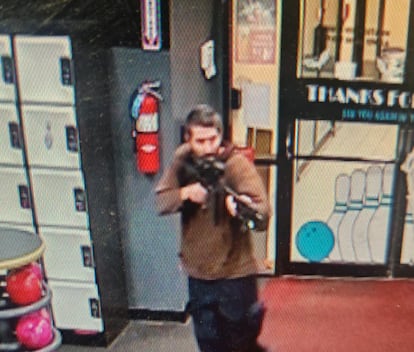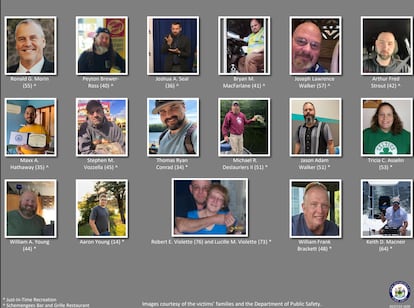Robert Card: The perpetrator of the Maine massacre warned a friend that he was preparing a mass shooting
The investigation has revealed that he chose the restaurant and the bowling alley — where he killed 18 people — because he believed those sites were spreading rumors about him being ‘a pedophile’


The investigation into the massacre of 18 people last week at a bowling alley and a restaurant in Lewiston, Maine, is beginning to shed light on the motives that led Robert Card, a 40-year-old reservist, to wield a military-style rifle, and later kill himself. Card was convinced that there was “a conspiracy against him and people were accusing him of being a pedophile,” according to legal documents, search warrants and affidavits made public on Tuesday. He also believed that the local businesses he attacked were spreading these rumors.
The latest findings from the investigation are serving to shed light on what could have been done to avoid the tragedy. And what has been revealed does not make authorities look good. On Monday, it emerged that both the U.S. Army Reserve and a Maine sheriff’s office were alerted to Card’s deteriorating mental health more than five months before he unleashed terror in Lewiston, a quiet rural community of about 40,000 residents in Maine. Documents also show that his paranoia was rising uncontrollably: six weeks ago, he punched a friend and warned him that he was planning a mass shooting.

Until now, the authorities — who decreed a 48-hour lockdown in the towns of Lewiston, Auburn, Lisbon, where they lost track of the murderer after he abandoned his SUV, and Bowdoin, his last place of residence — had said in daily press conferences during the crisis that they did not know that Card posed a danger.
What’s more, Maine Public Safety Commissioner Michael Sauschuck told reporters Saturday morning that he was unaware that he had been in psychiatric treatment for two weeks last summer when his behavior aroused the suspicions of his military colleagues. He was not forcefully admitted, and the incident did not trigger what is known in Maine as a “yellow alert.” As a result, Sauschuck said there was no reason to prevent Card from purchasing a gun or to take away the ones he had bought. Card had several weapons, some bought years ago; others, as recently as a few weeks before the massacre.
Additionally, Sagadahoc County Sheriff Joel Merry admitted over the weekend that he had sent out an alert in September after learning that Card had threatened to “shoot up the drill center” in Saco. Merry sent a sergeant to check on him, but did not find him at home, even though they heard noises inside the house, and did not pursue the matter further.
In July, Card had already been treated at a New York psychiatric hospital for two weeks after an incident at the West Point Military Academy, where he had accused “several other soldiers” of calling him a pedophile, pushed one and made vague threats, according to a report by the deputy sheriff, Chad Carleton.
A relationship breakup
The revelations about his obsession with the two local businesses targeted by Card come from a relative’s interview with the police, held about three hours after the shooting, in which he said that Card had “been delusional since a February 2023 bad break-up” with his girlfriend, whom, it seems, he met in Schmengees Bar & Grille, the scene of the massacre. Schmengees Bar & Grille and the bowling alley Just-In-Time Recreation were two of the four places that he believed were spreading rumors about him being a pedophile.
After killing 18 people and wounding 13 others, Card fled in his white SUV, which he abandoned about nine miles from the scene of the crime, in Lisbon. It was at that moment that police lost track of him. A desperate search ensued, with hundreds of local, county, state and federal officers from all over the country scouring the area for Card. It took more than 48 hours for them to find his body. He appeared to have shot himself not far from the car, in a trailer parked at the end of a path near the recycling plant where he had been working as a driver until last spring.
Until an autopsy is performed, it will not be known if he killed himself immediately after committing the murders or if he died later.
The identity of the 18 victims also took a couple of days to be released. The list includes 16 men and two women. Eight died in the restaurant; seven, at the bowling alley. The other three did not survive their first night in the Lewiston hospital. The deceased were between 14 and 76 years old, and among them were four deaf people, the restaurant manager, who tried to stop Card with a knife, a father and a son, and a couple in their seventies.
The massacre in Maine is the deadliest mass shooting so far this year, as well as the 10th deadliest in U.S. history. Maine is known for its hunting and fishing, and it is one of the easiest states in the country to buy a gun. Until now, it was also one of the safest: last year, only 29 homicides were recorded in Maine, which is home to of just over 1.3 million people.
It does not appear that the tragedy, which has revived the lackluster debate between supporters of gun control and defenders of the Second Amendment, will spark change in Maine’s lax laws regulating access to assault rifles.
Sign up for our weekly newsletter to get more English-language news coverage from EL PAÍS USA Edition
Tu suscripción se está usando en otro dispositivo
¿Quieres añadir otro usuario a tu suscripción?
Si continúas leyendo en este dispositivo, no se podrá leer en el otro.
FlechaTu suscripción se está usando en otro dispositivo y solo puedes acceder a EL PAÍS desde un dispositivo a la vez.
Si quieres compartir tu cuenta, cambia tu suscripción a la modalidad Premium, así podrás añadir otro usuario. Cada uno accederá con su propia cuenta de email, lo que os permitirá personalizar vuestra experiencia en EL PAÍS.
¿Tienes una suscripción de empresa? Accede aquí para contratar más cuentas.
En el caso de no saber quién está usando tu cuenta, te recomendamos cambiar tu contraseña aquí.
Si decides continuar compartiendo tu cuenta, este mensaje se mostrará en tu dispositivo y en el de la otra persona que está usando tu cuenta de forma indefinida, afectando a tu experiencia de lectura. Puedes consultar aquí los términos y condiciones de la suscripción digital.








































